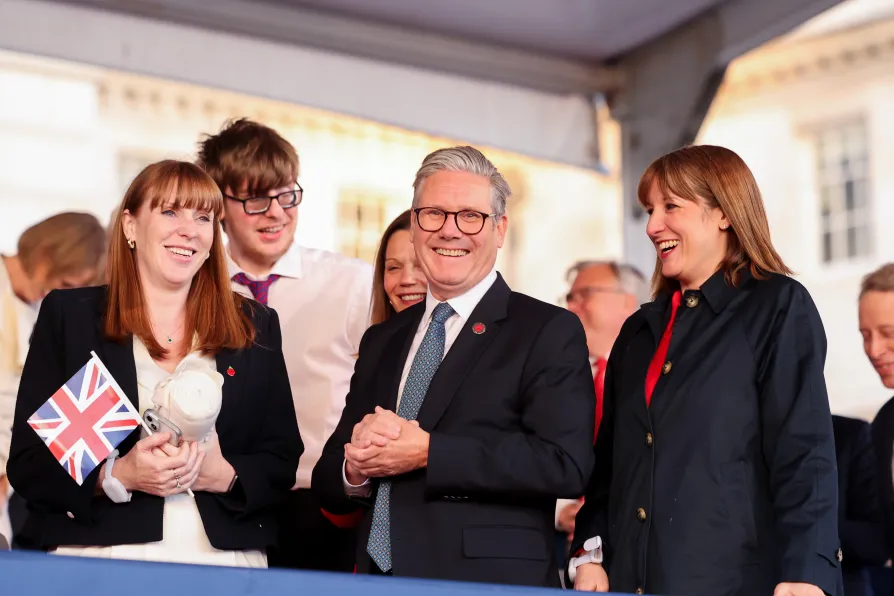
 (left to right) Deputy Prime Minister Angela Rayner, Prime Minister Keir Starmer and Chancellor of the Exchequer Rachel Reeves during the concert celebrating the 80th Anniversary of VE Day, May 8, 2025
(left to right) Deputy Prime Minister Angela Rayner, Prime Minister Keir Starmer and Chancellor of the Exchequer Rachel Reeves during the concert celebrating the 80th Anniversary of VE Day, May 8, 2025
IT SEEMS that the winds of discontent have finally started to blow around the Cabinet table. It is dawning, partially and belatedly, on Keir Starmer that he has made a mess of governing.
It is also dawning on his colleagues that they might be plunged into a struggle over the keys to Number Ten well before the next general election.
First, there has been the possible U-turn over the cut to the winter fuel benefit, announced last year. It took away assistance from 10 million older people, many of whom relied upon the benefit at a time of soaring energy costs.
There are hints of more capitulations to come, perhaps even on the cruel two-child benefit cap.
Starmer is claiming that these course adjustments are now affordable because the economy is improving. Given that this week’s figures have shown both inflation and government borrowing rising by more than anticipated, this is, like so much the Prime Minister intones, unlikely to be true.
What is certain is that this month’s local election results and the loss of the Runcorn by-election have shown that Labour is in an electoral death spiral. Elected on a shrivelled share of the vote 10 months ago, it has sunk still further since.
There is no doubt that the renewed austerity which Chancellor Rachel Reeves has embraced is the main single cause of this collapse, with the winter fuel benefit cut totemic of her Treasury-designed City-first economic strategy.
Mass pressure has also played a part, exemplified this week by the huge lobby of disabled people against Reeves’s planned attack on their benefits.
So crude political calculation has surely been decisive in Starmer tiptoeing away from his austerity agenda.
It is certain that such calculations lie behind Deputy Prime Minister Angela Rayner’s carefully leaked letter to Reeves urging increased taxes on the wealthy rather than further welfare cuts in her Budget this autumn.
That her “secret memo” also apparently advocated benefit cuts for migrants shows that this is hardly a principled challenge to the government’s direction, in which Rayner has, of course, been fully complicit, but rather populist political positioning.
If support for Starmer does collapse to the point where he leaves office, Rayner will be at the head of the queue to take over. She will pose as the champion of the “soft left” in a contest in which the rules have been so rigged by the Starmer gang that there is no chance of a genuine Corbyn-style socialist getting on the ballot paper.
She will likely face off against Health Secretary Wes Streeting, the Blairite darling who is on political manoeuvres of his own, reaching out, however improbably, to figures on the left.
Labour members would probably prefer Rayner, with her union-friendly reputation, to an NHS privatiser. Streeting has the additional burden of being unlikely to retain his Ilford North parliamentary seat at the next time of asking, having only prevailed over pro-Gaza independent Leanne Mohamad by a whisker last year.
Education Secretary Bridget Phillipson remains a wild card option. Reeves has probably sunk her own chances with her aggressively right-wing management of — or by — the Treasury.
It is possible that the Starmer gang will introduce further rule changes to shift the decision back to the parliamentary party alone, where rightwingers hold a decisive edge over all and any definitions of the left. Trade unions should surely stand firm against such a scheme.
And they should also take the lead in driving a complete break with austerity and the government’s whole disastrous course. It will take more than one partial U-turn and a secret memo to do the job.

Our two-tear Chancellor’s woes at PMQs caused a multimillion-pound sinking feeling on the bond market, writes ANDREW MURRAY

Rayner’s call for tax rises over cuts falls on deaf ears











